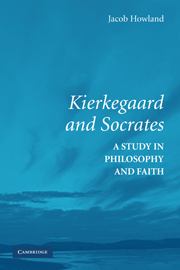Book contents
- Frontmatter
- Contents
- Note on Texts and Translations
- Acknowledgments
- Kierkegaard and Socrates
- Introduction
- 1 Johannes Climacus, Socratic Philosopher
- 2 Climacus's Thought-Project
- 3 Platonic Interlude: Eros and the God
- 4 Climacus's Poetical Venture
- 5 The Paradox and the Passion of Thought
- 6 Self-Love and Offense
- 7 Faith and the Contemporary Follower
- 8 Climacan Interlude: On Historical Necessity
- 9 The Follower at Second Hand and The Moral
- 10 Socrates in Postscript
- Epilogue: Kierkegaard on Christ and Socrates
- Works Cited
- Index
9 - The Follower at Second Hand and The Moral
Published online by Cambridge University Press: 01 December 2009
- Frontmatter
- Contents
- Note on Texts and Translations
- Acknowledgments
- Kierkegaard and Socrates
- Introduction
- 1 Johannes Climacus, Socratic Philosopher
- 2 Climacus's Thought-Project
- 3 Platonic Interlude: Eros and the God
- 4 Climacus's Poetical Venture
- 5 The Paradox and the Passion of Thought
- 6 Self-Love and Offense
- 7 Faith and the Contemporary Follower
- 8 Climacan Interlude: On Historical Necessity
- 9 The Follower at Second Hand and The Moral
- 10 Socrates in Postscript
- Epilogue: Kierkegaard on Christ and Socrates
- Works Cited
- Index
Summary
Prior to Chapter Five, Climacus has established that neither historically contemporary followers nor followers at second hand are automatically true contemporaries of the god. This does not mean, however, that there are no significant historical differences between these two groups – for there are such differences, and they stem to a great extent from the astonishing success of the god's early followers. In particular, the circumstances in which the first followers encountered the god and wrestled with the question of faith are radically different from those in which followers at second hand do so. The former inhabited a world that was hostile to their faith, whereas the situation is quite otherwise for most of the latter. Indeed, Climacus's first readers (not to speak of his latest readers, who live in a world that bears little resemblance to the Denmark of 1844) were citizens of a Christian nation, and were almost all Christians themselves. They would thus have been inclined to regard themselves as followers of the god before ever having read Fragments, and as having been such more or less from birth – even though they might have previously given little or no thought to what it means to be a follower.
Do these historical differences between contemporary followers and followers at second hand have any bearing on the decision of faith? And are there historical differences among the followers at second hand that may also bear on this decision?
- Type
- Chapter
- Information
- Kierkegaard and SocratesA Study in Philosophy and Faith, pp. 173 - 187Publisher: Cambridge University PressPrint publication year: 2006

